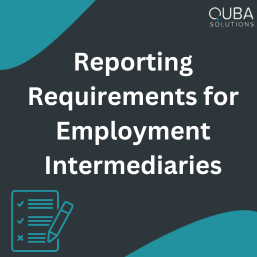
Reporting requirements for employment intermediaries
Employment intermediary reporting is an essential part of running a recruitment agency; submitting the reports are compulsory. Read our help guide to employment intermediary reporting below.

What is an Employment Intermediaries Report?
An agency that supplies temporary workers to an end client and does not pay those workers on a PAYE (Pay As You Earn) basis, will need to submit an employment intermediaries report. This obligation means you must report on any worker paid through an umbrella company, CIS (Construction Industry Scheme) contracting company, personal service company, or similar third-party entity. This report is a critical compliance measure for agencies, ensuring transparency and adherence to HMRC (Her Majesty’s Revenue and Customs) regulations.
Why Were These Rules Introduced For Employment Intermediary Reporting
HMRC identified a recurring issue where intermediaries were facilitating self-employment and supplying UK-based workers from offshore locations. This practice often led to tax evasion and loss of revenue for the UK government. To combat this, the government introduced new legislation that requires all intermediaries, including recruitment agencies, to submit detailed information about the workers they supply and the payments they make. These agencies must report this data quarterly to ensure consistent and up-to-date oversight.
As a Recruitment Business, Am I Definitely an Intermediary?
Yes, under this legislation, you are considered an intermediary if you arrange for an individual to work for a third party or pay for work done for a third party. This broad definition encompasses most recruitment businesses, making it essential for you to understand and comply with the reporting requirements.
Do I Need to Register for the Intermediary’s Report?
To submit an employment intermediaries report, you need a Government Gateway account. If you do not already have one, you can create an account when submitting your first report. Additionally, you will need your Employer PAYE reference and Accounts Office reference, which are essential for the registration process and subsequent reporting.
How Do I Submit a Report?
The report must be submitted using the official HMRC template, available to download on the HMRC website. After completing the template, you must log in with your Government Gateway details and upload the report. This process ensures that all submissions are standardised and can be efficiently processed by HMRC.
What Are the Reporting Periods and Deadlines for Employee Intermediary Reporting?
The reporting periods and submission deadlines are as follows:
- 6th January to 5th April: Submission deadline is 5th May
- 6th April to 5th July: Submission deadline is 5th August
- 6th July to 5th October: Submission deadline is 5th November
- 6th October to 5th January: Submission deadline is 5th February
It is crucial to adhere to these deadlines to avoid penalties and ensure compliance with HMRC regulations.
What Happens if I Forget to Submit a Report or if I Make a Mistake When Submitting the Report?
Failing to submit a report on time, or submitting an incomplete or incorrect report, will result in fines. The penalties increase with the number of late reports submitted within a 12-month period:
- £250 for the first offence
- £500 for the second offence
- £1,000 for any further offences within the 12-month period
If there is a pattern of non-compliance or a series of breaches, HMRC can impose fines of up to £600 for every day a report is overdue. These penalties underscore the importance of timely and accurate reporting.
There is an appeal process for penalties, details of which are published on the HMRC website. This process allows businesses to contest fines if they believe there has been an error or extenuating circumstances.
Do I Need to Report on My Permanent Placements?
No, the employment intermediaries reporting rules do not apply to permanent placements. These regulations target temporary workers who aren’t paid through PAYE, while they exclude permanent employees, as employers typically pay them via PAYE.
Importance of Compliance
Compliance with employment intermediaries reporting requirements is not just a legal obligation but a crucial aspect of maintaining the integrity and transparency of the recruitment industry. By adhering to these rules, agencies help ensure that all workers are properly accounted for and that appropriate taxes are paid, contributing to the overall economic health of the country.
Best Practices for employment intermediary reporting compliance
- Regular Training and Updates: Ensure that all relevant staff are trained on the reporting requirements and any updates to the legislation. Regular training sessions can help prevent errors and omissions in reports.
- Accurate Record-Keeping: Maintain detailed and accurate records of all temporary workers and the entities through which they are paid. This practice will make it easier to compile and submit accurate reports.
- Timely Submissions: Set internal deadlines well before the HMRC submission deadlines to allow time for reviewing and correcting any potential errors.
- Use of Technology: Invest in software solutions that can help automate the data collection and reporting process, reducing the likelihood of human error and ensuring consistency in reporting.
Understanding and adhering to the employment intermediaries reporting requirements is essential for recruitment agencies and other intermediaries. By following these guidelines, you not only comply with HMRC regulations but also contribute to a fairer and more transparent labour market. The penalties for non-compliance are significant, but with careful attention to detail and a proactive approach to reporting, you can avoid these fines and ensure your business operates smoothly and lawfully.
Need some assistance with employment intermediary reporting? Get in touch with our friendly team to discuss your needs.
Useful links for employment intermediary reporting:
Gov.uk’s :

Let’s chat about
your business needs
Get in touch and find out how we can take your recruitment business to the next level. You can book an appointment or simply give our team a call on 01305 233 178.
